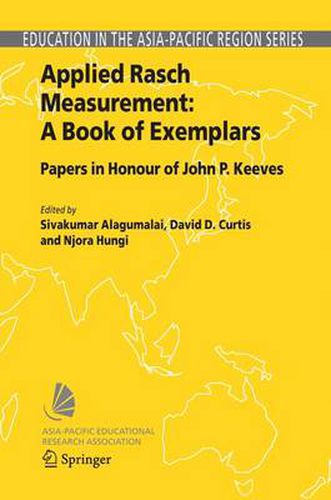Readings Newsletter
Become a Readings Member to make your shopping experience even easier.
Sign in or sign up for free!
You’re not far away from qualifying for FREE standard shipping within Australia
You’ve qualified for FREE standard shipping within Australia
The cart is loading…






This title is printed to order. This book may have been self-published. If so, we cannot guarantee the quality of the content. In the main most books will have gone through the editing process however some may not. We therefore suggest that you be aware of this before ordering this book. If in doubt check either the author or publisher’s details as we are unable to accept any returns unless they are faulty. Please contact us if you have any questions.
While the primary purpose of the book is a celebration of John’s contributions to the field of measurement, a second and related purpose is to provide a useful resource. We believe that the combination of the developmental history and theory of the method, the examples of its use in practice, some possible future directions, and software and data files will make this book a valuable resource for teachers and scholars of the Rasch method. This book is a tribute to Professor John P Keeves for the advocacy of the Rasch model in Australia. Happy 80th birthday John! xii There are good introductory texts on Item Response Theory, Objective Measurement and the Rasch model. However, for a beginning researcher keen on utilising the potentials of the Rasch model, theoretical discussions of test theory and associated indices do not meet their pragmatic needs. Furthermore, many researchers in measurement still have little or no knowledge of the features of the Rasch model and its use in a variety of situations and disciplines. This book attempts to describe the underlying axioms of test theory, and, in particular, the concepts of objective measurement and the Rasch model, and then link theory to practice. We have been introduced to the various models of test theory during our graduate days. It was time for us to share with those keen in the field of measurement in education, psychology and the social sciences the theoretical and practical aspects of objective measurement.
$9.00 standard shipping within Australia
FREE standard shipping within Australia for orders over $100.00
Express & International shipping calculated at checkout
This title is printed to order. This book may have been self-published. If so, we cannot guarantee the quality of the content. In the main most books will have gone through the editing process however some may not. We therefore suggest that you be aware of this before ordering this book. If in doubt check either the author or publisher’s details as we are unable to accept any returns unless they are faulty. Please contact us if you have any questions.
While the primary purpose of the book is a celebration of John’s contributions to the field of measurement, a second and related purpose is to provide a useful resource. We believe that the combination of the developmental history and theory of the method, the examples of its use in practice, some possible future directions, and software and data files will make this book a valuable resource for teachers and scholars of the Rasch method. This book is a tribute to Professor John P Keeves for the advocacy of the Rasch model in Australia. Happy 80th birthday John! xii There are good introductory texts on Item Response Theory, Objective Measurement and the Rasch model. However, for a beginning researcher keen on utilising the potentials of the Rasch model, theoretical discussions of test theory and associated indices do not meet their pragmatic needs. Furthermore, many researchers in measurement still have little or no knowledge of the features of the Rasch model and its use in a variety of situations and disciplines. This book attempts to describe the underlying axioms of test theory, and, in particular, the concepts of objective measurement and the Rasch model, and then link theory to practice. We have been introduced to the various models of test theory during our graduate days. It was time for us to share with those keen in the field of measurement in education, psychology and the social sciences the theoretical and practical aspects of objective measurement.